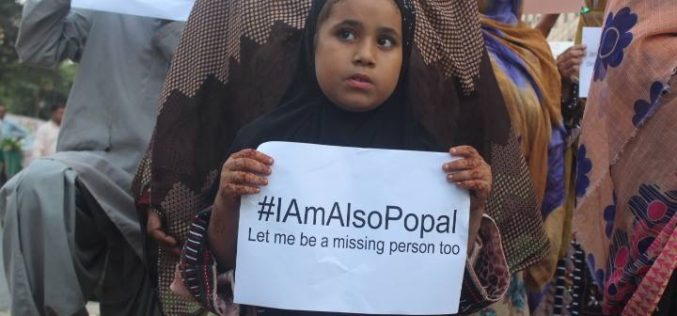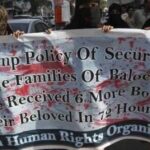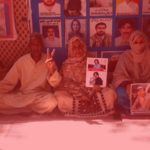Despite the prohibition of Collective Punishment in International laws and conventions, security forces continuously targeting women, children and family members of political and human rights activists in Balochistan.
In recent years, Baloch Human Rights Organization reported and documented several cases of collective punishment. However, no investigation has been made in this regard nor anyone was held accountable so far.
These crimes are being committed with total impunity, on the thinnest of pretexts. Forces are generating a perception that being a family member of a political and human rights activist is enough to get qualified for harassment, disappearance and execution.
For years, military establishment organized and sponsored death squads, comprised of local goons and criminals to act on their direction when needed. In return, they are empowered to grab lands, kidnap for ransom and kill anyone anytime.
In October 2018, a local death squad abducts Umeed Ali’s three minor children, Fareed, Pervaiz and Mahzaib from Goragi Rakhshan area of Washuk district. Their ages are in between four to seven years old. The members of the death squad threatened to kill the children if the family talk about the incident.
The family came forward on September 12, 2019, when they exhausted all options of the safe return of their children.
Umeed Ali family approached all the elders and political leaders of the area for the safe recovery of their children
-



Fareed Umeed Pervaiz Umeed Mahzaib Umeed
On August 9, 2019, Ali Akbar, a ten years old boy was picked up by intelligence officials from Turbat city of Kech district. He was released on the next day and was abducted again by local death squad members while traveling to Mand from Turbat.
The death squad members made some of Ali pictures public while he was in their custody. They contacted his family on behalf of intelligence officials and demanded his elder brother to appear in front of army officials and leave his activities in return of his brother. Ali’s whereabouts are still unknown.
-


Ali Akbar. Photo: Ashoob News Ali Akbar photo issued in Media
Hani Gul, a medical student in Hamdard University Karachi and a resident of Negwari Parha Gwadar was forcibly disappeared along with her fiancé, Mohammad Naseem on May 14, 2019. Both were subjected to inhuman treatment during detention and were forced to admit their involvement with Baloch Liberation Front (BLF), a nationalist militant organization in Balochistan.
“They severely tortured us. Whenever they asked me questions and if I don’t know the answer, they started beating Mohammad Naseem in front of me and whenever he failed to answer a question, the man started torturing me. It continues for several days”, explained Hani
Hani Gul was released on August 14, 2019, after three months of incommunicado detention but whereabouts of her fiancé Mohammad Naseem are still unknown.
Hani Gul approached the police to file First Information Report (FIR) which police denied to file. Later, she filed a court petition in Sindh High Court against enforced disappearance of her fiancé.

On September 23, 2019, she will be appearing for the court hearing in Sindh High Court.
On July 15, 2019, forces forcibly disappeared 80 years old Haji Hussain while traveling to Gwadar from Karachi. He was kept in incommunicado detention for 3 months and later released on September 12. One of his sons was killed by security forces 4 years ago.
On September 16, 2019, security forces released 75 years old Issa, a resident of Dasht Zyarati. On September 10, he was abducted by forces for the sixth time in last couple of years. His son, Fazul died in an encounter with security forces few years ago.
-


Haji Hussain. Issa. Photo: Ashoob News
On September 16, 2019, security forces raided home of Saeeda Baloch in Turbat district Kech. Saeeda Baloch along with her daughter and daughter-in-law was harassed for several hours. Forces took their mobile phones and threatened them not to contact their family members. She is the sister of Nasir Baloch, Information Secretary of Baloch National Movement, a political party championing for the sovereignty of Balochistan and cousin of Abdullah Abbas, a human rights defender and General Secretary of Baloch Human Rights Organization.


